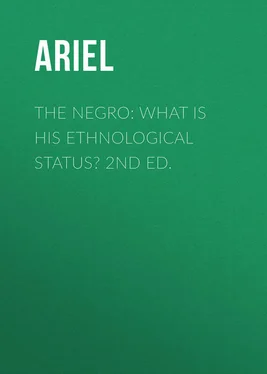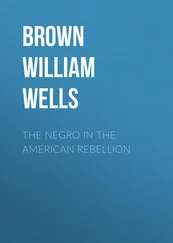Ariel - The Negro - What is His Ethnological Status? 2nd Ed.
Здесь есть возможность читать онлайн «Ariel - The Negro - What is His Ethnological Status? 2nd Ed.» — ознакомительный отрывок электронной книги совершенно бесплатно, а после прочтения отрывка купить полную версию. В некоторых случаях можно слушать аудио, скачать через торрент в формате fb2 и присутствует краткое содержание. Жанр: foreign_antique, foreign_prose, на английском языке. Описание произведения, (предисловие) а так же отзывы посетителей доступны на портале библиотеки ЛибКат.
- Название:The Negro: What is His Ethnological Status? 2nd Ed.
- Автор:
- Жанр:
- Год:неизвестен
- ISBN:нет данных
- Рейтинг книги:3 / 5. Голосов: 1
-
Избранное:Добавить в избранное
- Отзывы:
-
Ваша оценка:
- 60
- 1
- 2
- 3
- 4
- 5
The Negro: What is His Ethnological Status? 2nd Ed.: краткое содержание, описание и аннотация
Предлагаем к чтению аннотацию, описание, краткое содержание или предисловие (зависит от того, что написал сам автор книги «The Negro: What is His Ethnological Status? 2nd Ed.»). Если вы не нашли необходимую информацию о книге — напишите в комментариях, мы постараемся отыскать её.
The Negro: What is His Ethnological Status? 2nd Ed. — читать онлайн ознакомительный отрывок
Ниже представлен текст книги, разбитый по страницам. Система сохранения места последней прочитанной страницы, позволяет с удобством читать онлайн бесплатно книгу «The Negro: What is His Ethnological Status? 2nd Ed.», без необходимости каждый раз заново искать на чём Вы остановились. Поставьте закладку, и сможете в любой момент перейти на страницу, на которой закончили чтение.
Интервал:
Закладка:
We next take up Japheth. We know where he went, and what countries his descendants peopled, with equal certainty and on equal authority – and all outside concurrent history, equally clearly prove, that Japheth's descendants peopled Europe, whence they have spread over all the world. That they too belong to the white race, is also unquestioned, nor doubted by any that have eyes to see. That they were so before, and at the flood, and not negroes then, nor since, is equally undoubted and indisputable. We have not taken the trouble of showing step by step, where those two brothers went, and what countries they peopled seriatim , because they are admitted by all, learned and unlearned, to be and to have done just what is here stated in spreading over the world. It was, therefore, unnecessary to incumber this paper, by proving that which none disputes. This being so, then two of the three brothers, are known certainly, to be of the white race, and not of the negro, either before or after the flood.
We now take up the youngest brother, Ham. The evidence establishing the fact, that he too, and his descendants belong to the white race, with long, straight hair, high forehead, high noses and thin lips, is if possible still stronger , than that of either of his brothers; if indeed anything can, in human conception, be stronger than that, which is of perfect strength, and if this is true, then Ham can not be the father of the negro. As in the cases of the other two brothers, the Bible tells us where Ham, and his descendants went, and what countries they peopled, and where his race may be found at this day; and which likewise, all contemporaneous history abundantly testifies, and shows that they are of the white race, and were so before the flood, and from the flood continued so, and yet continue so to the present time ; and that not one of them, is of the negro race of this day. We will, in establishing the truths of the above declarations, take up two of Ham's sons and trace them and their descendants, from the flood to the present time, and show what they were, and what they are down to this day. These two sons of Ham, whose posterity we propose to trace, and show that they now belong to the white race, are Mizraim and Canaan, the second and the youngest of his sons. The families of all of the sons can be traced from the flood to the present day, but we presume two are sufficient, and that they be white; and we have selected Canaan intentionally and for a purpose that will be seen hereafter. Canaan was denounced by Noah, that he should be a servant of servants to his brethren, and if it turns out, in this investigation, as we know it will, that they belong to the white race , it will satisfactorily settle this question, that the curse of Noah did not make him and his descendants the black negro we now find on earth, much less Ham, who was not so cursed. The Bible plainly tells us, that the country now called Egypt, was settled by Mizraim, the second son of Ham, and was peopled by his descendants; that Mizraim, the second son of Ham, and grandson of Noah, gave his name to the country; that they called it the land of Mizraim, and by which name it is still known, to the present day, by the descendants of its ancient inhabitants; that they built many magnificent cities on the Nile – among them, the city of Thebes, one of the largest and most magnificent in its architecture, and the grandeur of its monuments and temples, the world ever saw. Its ruins at the present day, are of surpassing magnificence and grandeur. The city was named Thebes, to commemorate the Ark, that saved Noah, the grandfather of Mizraim, from the flood; the name of the Ark in Hebrew, being Theba . Then we take it for granted, all will admit, that what is now called Egypt, was settled by Mizraim, the son of Ham, and grandson of Noah. The Bible, and outside concurrent history, abundantly prove that he and his descendants, held, occupied and ruled over Egypt, and continued in the possession and the occupancy of the country as such, until long after the Exodus of the Hebrews, under Moses and Aaron; that Ham's descendants, through Canaan , in the persons of his sons Sidon and Heth, settled Sidon, Tyre and Carthage. This will not be denied by any intelligent Biblical student or historian. Sidon itself was named after Canaan's oldest son.
From Egypt in Africa, Mizraim's descendants passed over to Asia, and settled India, whence they spread over that continent; that great commerce sprung up between India, etc., and Egypt and connecting countries, which was carried on by caravans; that Greece and Rome subsequently, shared largely in this commerce, especially after the march of Alexander the Great to India, by the caravan route, three hundred and thirty-two years before our Saviour's birth. This commerce has continued to our day. All these facts are undeniable, and will be denied by none acquainted with the Bible and past history. These descendants, of this maligned Ham, were at, and after the flood, and continue to be, to this day , of the white race, all having long, straight hair, high foreheads, high noses and thin lips; that they are so, and as much so as the descendants of the other two brothers, and possessing all of the same general lineaments – lineaments that so long as the race shall exist, will be an eternal protest against their being of the negro race that we now have. But as we intend to show conclusively that Ham and his descendants were and are white, long, straight hair, etc., from Noah to the present time, so plainly and so positively that no fair or candid man can have the least doubt of its truth, we proceed to state: That we will now give the names of the country, now called Egypt, beginning with its first settlement by Mizraim, in regular order down, to enable the Biblical and historical student to refer readily to the histories of the different epochs, to detect any error, if we should make one, in tracing Ham's descendants, down to the present day. In Hebrew it is called Mizraim, in Coptic and Arabic (the former being now the name of its ancient or first inhabitants), it is called Misr or Mezr, being spelled in both these ways by the Arabian and Coptic writers. In Syro-Chaldaic and Hellenic Greek it is called Aiguptos – and in Latin, Ægyptus. In many of the ancient Egyptian and Coptic writings it is called Chimi , that is, the land of Ham, and is so called in the Bible, see Psalms cv, 23; cvi, 22, and other places. The ancient inhabitants now in Egypt, the Copts, are called the posterity of Pharaoh , by the Turks of the present day . The ancient Hyksos , or shepherd kings (patriarchs) of the Hebrews, are sometimes confounded in ancient history, with the descendants of Ham, being of the same original stock. Egypt has not had a ruler of its own since the battle of Actium, fought by Augustus Caesar, thirty years before our Saviour, as God by his prophet had foretold that their own kings would cease forever to reign over that country. After the battle of Actium, it became a Roman province, and since that time, it has been under foreign rule. It now is, and has been governed by the Turks since 1517.
It appears (see Asiatic Miscel., p. 148, 4to), that Mizraim, the son of Ham, and his sons (descendants), after settling Egypt, a portion went to Asia, which was settled by them, and that they gave their names to the different parts of the country where they settled, and which they retain yet . The names of these sons of Mizraim as given in history are as follows: Hind, Sind, Zeng, Nuba, Kanaan, Kush, Kopt, Berber and Hebesh, or Abash. From these children of Ham, we not only readily trace the present names of the countries, but that of the people also to this day; that they founded the nations of the Indus, Hindoos, Nubians, Koptos, Zanzebar, Barbary, Abysinia, the present Turks, is unquestioned and undoubted, by any intelligent scholar. That they are the white race, with long, straight hair, etc., is equally unquestionable, and are so this day , and as positively as that Shem and Japheth's descendants are now white. They first commenced to settle on the Nile in Africa, they then passed into Asia; and these two continents were principally settled by them. A portion of Europe (Turkey) is occupied by them – these, too, have long, straight hair, etc.
Читать дальшеИнтервал:
Закладка:
Похожие книги на «The Negro: What is His Ethnological Status? 2nd Ed.»
Представляем Вашему вниманию похожие книги на «The Negro: What is His Ethnological Status? 2nd Ed.» списком для выбора. Мы отобрали схожую по названию и смыслу литературу в надежде предоставить читателям больше вариантов отыскать новые, интересные, ещё непрочитанные произведения.
Обсуждение, отзывы о книге «The Negro: What is His Ethnological Status? 2nd Ed.» и просто собственные мнения читателей. Оставьте ваши комментарии, напишите, что Вы думаете о произведении, его смысле или главных героях. Укажите что конкретно понравилось, а что нет, и почему Вы так считаете.












